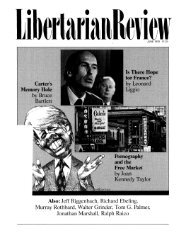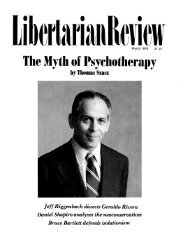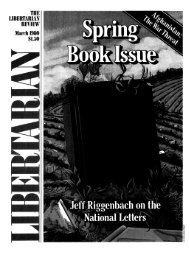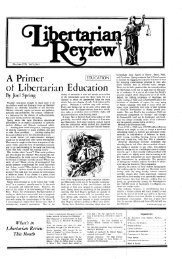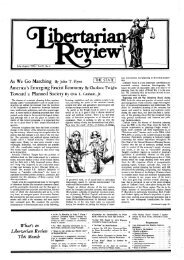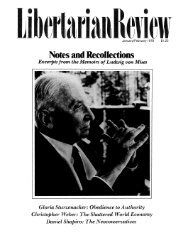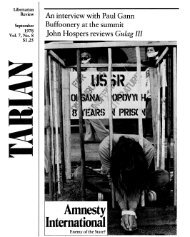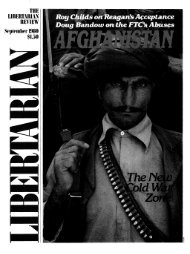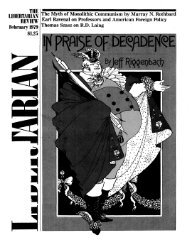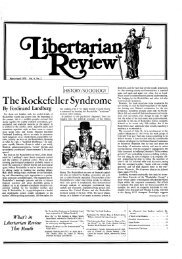The Libertarian Review July 1978 - Libertarianism.org
The Libertarian Review July 1978 - Libertarianism.org
The Libertarian Review July 1978 - Libertarianism.org
Create successful ePaper yourself
Turn your PDF publications into a flip-book with our unique Google optimized e-Paper software.
armed guards-and these are not infrequently off-dutymembers of the local police department: <strong>The</strong> chairman ofthe National Commission on the Reform· of SecondaryEducation, B. Frank Brown, estimated recently that nearlytwo-thirds of America's school systems have police ontheir payrolls.<strong>The</strong> American high school not only looks like a prison;from the point of view of its inmates (who are incongruouslycalled "students") it is one. When Fortunemagazine editor Charles Silberman investigated Americanpublic education for the Carnegie Corporation nearly adecade ago, he found that "students in most schools cannotleave the classroom (or the library or the study hall)without permission, even to get a drink of water or to go tothe toilet, and the length of time they can spend there isrigidly prescribed. . .. the corridors are usually guardedby teachers and students on patrol duty, whose principalfunction is to check the credentials of any student walkingthrough. In the typical high school, no student may walkdown the corridor without a form, signed by a teacher,telling where he is coming from, where he is going, and thetime, to the minute, during which the pass is valid. Inmany schools, the toilets are kept locked except duringclass breaks, so that a student not only must obtain a passbut must find the custodian and persuade him to unlockthe needed facility. (Crisis in the Classroom, 1970)Or, as one New York high school student put it a yearearlier: li<strong>The</strong> main thing that's taught us in school is how tobe good niggers, obey the rules. . .. Not only are weforced to attend school in the first place, we have to carryID cards at all times, walk on the right" side of the hall, andif the teacher doesn't want us to, we can't even take a piss!"(How Old Will You Be in 1984?, Diane Divoky, 1969)And the only thing that seems to have changed in thepast ten years is that the inmates, in growing numbers,have begun striking back. Time magazine reported a fewmonths ago that more than five thousand public secondaryschool teachers are attacked by students every month inthis country-and about a thousand of them are seriouslyinjured. But the public schools' response is not to makeconditions less prison-like in hopes student behavior mightbecome less inmate-like; far from it. <strong>The</strong>ir response is todouble and redouble the size of patrols, to issue walkietalkies,to establish closed circuit TV, emergency phones inclassrooms, and special isolation classrooms for theprivate use of incorrigible IIdisciplinary problems."Moreover, in so doing, they are apparently only carryingout the mandate by the parents of their charges. Educationprofessors and authors Neil Postman and CharlesWeingartner reported five years ago that 65 percent ofAmerican parents feel the schools are Ilgood", Ilfair" orIinot so bad." One year later, the Charles F. KetteringFoundation's annual "Survey of the Public's AttitudesToward the Public Schools" found that 80 percent of thosewho have children in the public schools would rate theschools performance with their children A, B, or C. AsCharles Silberman puts it, ."<strong>The</strong> UnitedStates has the kindsof schools its citizens have thus far demanded." He citesthe 1969 Louis Harris poll in which the parents of publichigh school students frankly conceded that they believe"maintaining discipline" is more important than allowing(much less encouraging) "student self-inquiry"-the selfmotivated,self-directed learning of those ideas and skillsthe student finds interesting. But the freedom to learnwhat, when and as one wishes must be the first premise ofany program of truly libertarian education. Maintainingdiscipline, it would seem, is more important than liberty.<strong>The</strong> vocal minorityIf between 65 and 80 percent of public school parents feelthis way, between 20 and 35 percent feel otherwise. And ingrowing, ever more insistent numbers, that minority ismaking itself heard. Its members have recently managed toforce reconsideration by Congress of the idea of tuition taxcredits for parents who pay taxes to support the publicschools but feel compelled, out of regard for their children,to spend further money on private school tuition. <strong>The</strong> bill,sponsored by Senators Robert Packwood (Rep.-Ore.) andDaniel P. Moynihan (Dem.-N.Y.), calling for credits of upto $250 against college tuition and $100 against privateelementary and secondary school tuition was passed by theHouse on June 1. Although the Senate is even morefavorably disposed than the House to such credits, PresidentCarter has threatened to veto any bill which gives taxcredits for tuition below the college level. Even if themeasure falls by the wayside this year, its message remainsas a reminder to politicians in the future: the middle incomeAmericans who, as Senator Moynihan puts it, "pay20<strong>Libertarian</strong> <strong>Review</strong>



